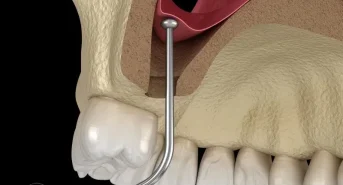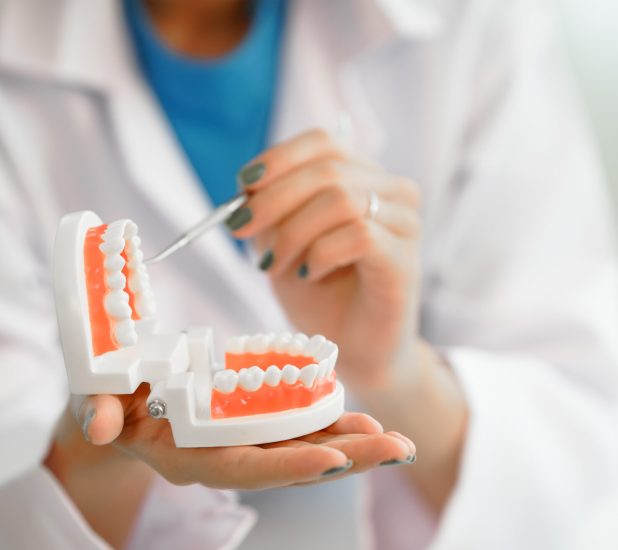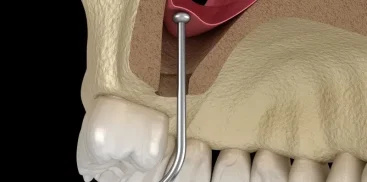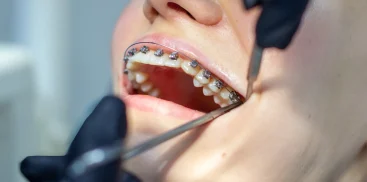What is teeth whitening?
The teeth whitening procedure in a dental office is based on the application of a specialized product that affects the enamel and dentin, leading to their lightening. The product is then activated with a special light, causing its components to start the teeth whitening process. Some dentists prefer the term “lightening” of teeth, noting that the final effect depends on the original shade of the patient’s teeth. The most commonly used substances include carbamide peroxide, hydrogen peroxide, or urea peroxide. However, it should be remembered that the whitening effect is temporary, and the procedure should be repeated to maintain the results.
What are the best methods for teeth whitening in Warsaw?
Home teeth whitening methods
Toothpaste manufacturers compete with promises of whitening, but the actual effects may require a long wait and are often far from expectations. Moreover, these methods can lead to enamel abrasion, increasing the risk of damage and decay. For lasting and safe results, it is best to consult a dentist who will propose individually tailored solutions. There are also whitening trays available on the market, but due to the lack of personalization, there is a risk that the whitening agent may get on the gums, causing damage and negatively affecting the teeth.
Teeth whitening at the dentist – a professional approach
Several methods can be distinguished in professional teeth whitening at the dentist:
- Tartar removal: This procedure eliminates the buildup of mineralized dental plaque. Scaling, sandblasting, and tooth polishing maintain proper oral hygiene.
- ZOOM lamp whitening: This is an effective and faster method using a whitening gel with hydrogen peroxide activated by LED light. Patients enjoy the effect of white teeth after the first treatment, which lasts about an hour.
- Tray method: Teeth whitening using trays customized to the patient’s needs. The trays are filled with a special gel and applied to the teeth. To achieve a satisfactory effect, the trays should be used for several weeks. Combined with the ZOOM lamp treatment, the effects will be more lasting.
- Veneers: Veneers are composite or porcelain overlays. They are applied to damaged or decayed teeth. This method is irreversible and requires grinding of the natural teeth.
Is it worth whitening teeth at the dentist?
Professional teeth whitening performed by a dentist is the most effective and safest method to achieve a white smile while protecting oral health. However, it should be noted that teeth may be sensitive in the first few days after the procedure. Home whitening or in a beauty salon may carry risks for the health of teeth and oral cavity. Dental care, which is lacking in beauty salons, is crucial. The Warsaw Dental Center offers teeth whitening under the supervision of experienced hygienists and constantly under the control of a dentist, ensuring safety and lasting, satisfactory effects. If you value the safety of the procedure and the guarantee of original materials, it is worth investing in teeth whitening in a dental office.
What does teeth whitening look like at the Warsaw Dental Center?
The initial step is thorough teeth cleaning, performed by an experienced hygienist. In the next stage, to protect the gums from the whitening gel, the hygienist uses a liquid dental dam. Then, the whitening gel is applied four times, with each application activated by light for 15 minutes, totaling 60 minutes for the entire procedure. It is possible to end the whitening after three 15-minute sessions, but for better and more lasting effects, four sessions are recommended. After the whitening procedure, the hygienist takes an impression of the teeth, which is needed to prepare an individual whitening tray. This tray, along with the home whitening gel, will be ready for pickup at our clinic after a few days. This allows the whitening process to continue at home for about a week after the clinic treatment.
How much does teeth whitening cost in Warsaw?
The price of teeth whitening is 2500 PLN and includes a 60-minute whitening treatment in the office, preparation of personalized home whitening trays, and whitening gel sufficient for about a week of use.
Which teeth cannot be whitened?
Teeth affected by decay, covered with crowns or veneers, as well as those that have undergone root canal treatment, should not be whitened because they do not respond to the whitening process. A dentist can determine which teeth should not be subjected to whitening. Therefore, self-whitening at home or in a beauty salon may not be safe.
What are the contraindications to teeth whitening?
Contraindications to teeth whitening include:
– Pregnancy and breastfeeding
– Decay
– Gum inflammation and periodontitis
– Allergies to whitening agents
– Patients under 16 years of age
– Drug-induced discolorations
– Teeth with prosthetic restorations like crowns and veneers or extensive composite fillings, as they do not undergo whitening
How many times should teeth be whitened? How often can teeth whitening be performed in Warsaw?
It is important to consult a dentist to determine the appropriate frequency of teeth whitening in the office for your specific situation. Factors such as tooth sensitivity, the degree of staining, and the overall health of teeth and gums will influence this decision. Generally, teeth whitening in the office is not performed frequently due to potential tooth sensitivity and the need to preserve the integrity of natural enamel. Your dentist will advise how often this procedure can be safely repeated in your individual case.
How long does the effect last after teeth whitening in Warsaw?
The duration of teeth whitening effects can vary significantly depending on several factors, such as the method used, individual habits, and the initial condition of the teeth. Generally, the whitening effect after professional whitening in the office can last from six months to two years. However, this can be a shorter or longer period depending on:
1. Diet: Consuming substances that cause staining, such as coffee, tea, red wine, and certain fruits and vegetables, can shorten the duration of the whitening effect.
2. Oral hygiene: Regular tooth brushing, using dental floss, and dental check-ups can help maintain the whitening effect for a longer time.
3. Tobacco use: Smoking or using tobacco products can quickly stain teeth, reducing the durability of the whitening effect.
4. Initial tooth color: Teeth with a yellow shade usually respond well to whitening, and the effects can last longer, while teeth with a gray or brown shade may not be as effectively whitened, and the results may not last as long.
5. Supplementary treatments: Using whitening products at home provided by the dentist or available over-the-counter can help maintain the results for a longer time.
6. Individual characteristics: The natural porosity of teeth and enamel resistance to staining can also affect how long the effects last.
To maximize the duration of teeth whitening effects, it is important to follow post-treatment care instructions provided by the dentist or hygienist, maintain good oral hygiene, and possibly adjust lifestyle habits contributing to staining. Regular supplementary treatments can also help extend the durability of whitening results.
Does whitening damage teeth?
Teeth whitening, when performed correctly and under the supervision of a dentist, does not damage teeth. Professional whitening products are designed to be safe for enamel when used according to recommendations. However, overuse or improper use of whitening products can lead to tooth sensitivity and damage to the enamel or gums. It is important to follow the dentist’s instructions and not to overuse over-the-counter whitening products. Regular dental check-ups and consultations before starting any whitening treatment are key to ensuring the health and safety of teeth.
Does teeth whitening hurt?
Teeth whitening can sometimes cause tooth sensitivity or discomfort, especially during or immediately after the treatment. Some people may experience temporary sensitivity to hot or cold temperatures. This is usually mild and temporary, subsiding on its own within a few days after the whitening treatment. Using products designed to minimize sensitivity, as well as following the dentist’s instructions for post-treatment care, can help reduce discomfort. If you have concerns about pain or sensitivity, it is important to discuss them with the dentist before starting the whitening process.
How long do teeth hurt after whitening?
Discomfort or sensitivity after teeth whitening usually lasts for a short time, typically a few days to a week. This can vary depending on the individual’s sensitivity, the concentration of the whitening agent used, and the whitening method. For most people, any sensitivity or discomfort subsides within 24 to 48 hours after the treatment. If pain persists for longer than a week or becomes severe, it is important to consult a dentist to ensure there are no underlying issues that need to be addressed.
What are the indications and what should not be done after teeth whitening?
After teeth whitening, dentists usually recommend the following care tips to ensure the best results and maintain the whiteness of the teeth:
1. Avoid Staining Products: For at least 48 hours after whitening, a so-called white diet should be followed, i.e., avoid eating and drinking products that can stain teeth, such as coffee, tea, red wine, dark sodas, berries, and dark sauces. This period is crucial because teeth are more susceptible to staining right after whitening.
2. Practice Good Oral Hygiene: Continue brushing your teeth at least twice a day and flossing daily. Consider using toothpaste designed for whitened teeth to help maintain the results.
3. Use a Straw: When consuming beverages that can stain teeth, using a straw can help minimize direct contact with the teeth.
4. Quit Smoking: Tobacco can quickly stain teeth, so quitting smoking or using tobacco products can help maintain the results of the whitening treatment.
5. Follow Dentist’s Instructions for Continuing Whitening at Home: Your dentist may provide you with a home whitening kit for touch-ups. Use these products according to the dentist’s recommendations to maintain the whiteness of your teeth.
6. Regular Dental Check-ups: Regular visits to the dentist for cleaning and check-ups can help maintain oral health and the appearance of teeth.
7. Avoid Acidic Foods and Beverages: Acidic food and drink can cause erosion of tooth enamel over time, making teeth more susceptible to staining. Limit the consumption of such products to protect the enamel.
8. Rinse Mouth After Eating and Drinking: If you consume foods or drinks that can stain teeth, rinsing your mouth with water can help minimize the risk of staining.
Following these recommendations can help maintain the results of teeth whitening treatment and enjoy a brighter smile for a longer time.
Where is the best place to whiten teeth in Warsaw?
The Warsaw Dental Center is the ideal place to brighten your smile, as we not only ensure the safety of the procedure but also guarantee the use of authentic materials. Additionally, after the treatment in the office, you will receive customized trays and gel for home use, which will help maintain the whitening effect for longer. Our comprehensive post-treatment support will provide you with detailed guidelines for the recovery period, and our qualified staff will answer all your questions and address any concerns.
Article written on 03.10.2022 and updated on 26.02.2024 based on the latest technology and research.










